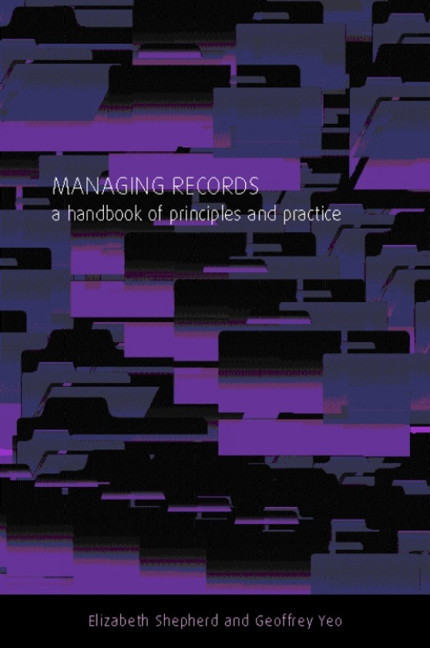Book contents
- Frontmatter
- Contents
- Preface
- Editorial note
- Introduction
- 1 Understanding records management
- 2 Analysing the context for records management
- 3 Classifying records and documenting their context
- 4 Creating and capturing records
- 5 Managing appraisal, retention and disposition
- 6 Maintaining records and assuring their integrity
- 7 Providing access
- 8 Implementing records management: practical and managerial issues
- Conclusion
- Appendix A Bibliography and sources of further information
- Appendix B Select list of national and international standards
- Appendix C Professional organizations for records managers in English-speaking countries
- Index
1 - Understanding records management
Published online by Cambridge University Press: 09 June 2018
- Frontmatter
- Contents
- Preface
- Editorial note
- Introduction
- 1 Understanding records management
- 2 Analysing the context for records management
- 3 Classifying records and documenting their context
- 4 Creating and capturing records
- 5 Managing appraisal, retention and disposition
- 6 Maintaining records and assuring their integrity
- 7 Providing access
- 8 Implementing records management: practical and managerial issues
- Conclusion
- Appendix A Bibliography and sources of further information
- Appendix B Select list of national and international standards
- Appendix C Professional organizations for records managers in English-speaking countries
- Index
Summary
This chapter introduces the core concepts and terms used in the book. It describes the broad professional context of records management and outlines the intellectual frameworks that underpin it.
Defining the key terms in records management
What is records management?
Records management is the ‘field of management responsible for the efficient and systematic control of the creation, receipt, maintenance, use and disposition of records …’ (ISO 15489-1:2001, clause 3.16). As a discipline, it developed from 20th-century office efficiency programmes and from the older profession of archives management. Archives were originally records kept to support the rights and obligations of organizations and individuals, but the archives profession came to be seen as concerned only with older records, kept to support historical research. By the mid 20th century, records managers were employed by archival institutions in the public sector, with the aim of controlling the inflow of ‘modern records’ into historical archives. While this is still one of the functions of records management, it is no longer the only role, nor even the predominant role, of the records manager. Records management now covers the management of records, regardless of age, to meet the needs of private and public sector organizations and the wider society as well as the research community. It earns its place in the life of an organization through its contribution to business aims and organizational goals.
Records management is a necessary part of the work of almost all employees within an organization (and also of individuals in their personal lives). This book focuses on the organizational context, where records managers are the specialists in records management but rely on the co-operation and participation of all employees.
To understand records management more fully it is necessary to look at the meaning of the word record. In the past, records management was equated with the management of papers located in organizational filing systems. The growth of new technology and information management has led records managers to seek a more rigorous definition of records, in order to explain what distinguishes them from other organizational resources, and to show how managing records differs from managing documents, data or information.
What is a record?
Originally record was a legal term: records were writings preserved in courts of law and accepted by them as authentic testimony of a completed action.
- Type
- Chapter
- Information
- Managing Recordsa handbook of principles and practice, pp. 1 - 29Publisher: FacetPrint publication year: 2003



